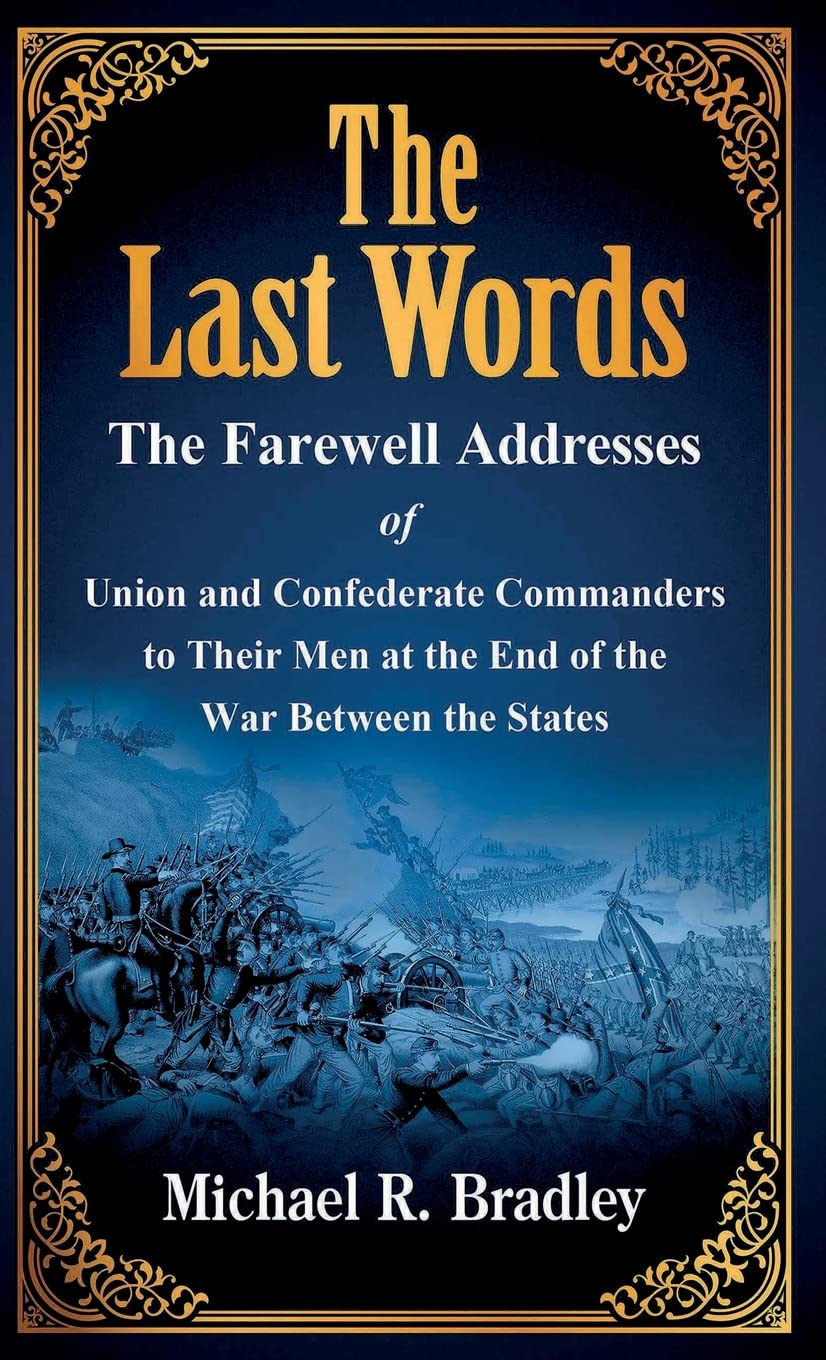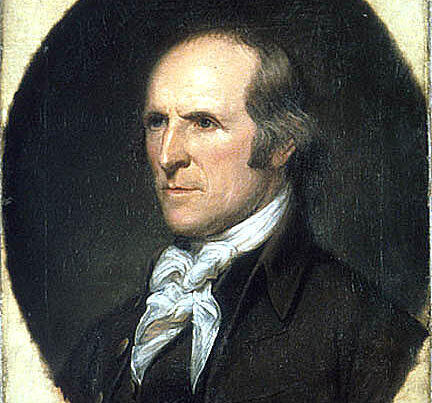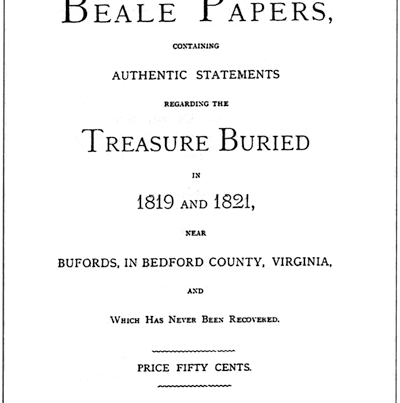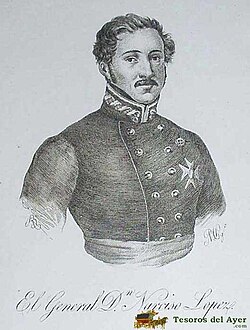A review of The Last Words: The Farewell Addresses of Union and Confederate Commanders to Their Men at the End of the War Between the States by Michael R. Bradley (Charleston Athenaeum Press, 2022)
The idea for this book came when Mrs. Susan Harris asked Dr. Michael Bradley, “Is there a book about what officers said to their men when the war was over?” He replied, “No, but there will be.” The result is an excellent work, which looks at the words, and therefore, the thoughts, of men as they prepared to end their military service and return to civilian life. These words take on more importance when you consider that this was the last time many of these men would be together. Having passed through a defining moment in American history, the words they chose to describe their participation in that war have importance to those seeking answers to the question: Why war?
Gene Kizer, Jr., of Charleston Athenaeum Press, in an extensive prologue entitled Setting the Stage, champions the states’ rights view of events leading up to the war. He marshals a regiment of facts showing the cultural, economic and political differences between the North and the South. There is no doubt left that the “Slavery as the single cause of the war” viewpoint is a contrivance of modern academia, which has abandoned truth and facts for propaganda which fits their political agenda.
The body of the book picks up on this, showing that in the 19 addresses by leaders on both sides, there is virtually no mention of slavery as a cause of the fighting. What were the men fighting for? Of course the South was fighting because they were invaded, but their overwhelming view of causes centered on their view of a strict interpretation of the Constitution and the limited nature of the federal government. The South was more interested in free trade as that was of benefit to their economy. They also had the misfortune of being invaded, and therefore they had to defend hearth and home.
The North, alternatively, had a positive view of a strong federal government, and virtually ignored the 10th Amendment to the Constitution. They had abandoned the principles of the Founding Fathers, who overwhelmingly ratified the Constitution as a document limiting the federal government’s powers, but not the powers of the state governments. To the North, the federal government was supreme, and the American ideal of government by the consent of the governed, was left in the dust. The North overwhelmingly favored protective tariffs, which benefited their industry and commerce at the expense of Southern agriculture. They saw ‘union’ as a monolithic edifice, which one could enter voluntarily but never leave.
The addresses in the book follow these same general ideas. The North fought for union, which in their mind included even the seceded states. They also fought for control of the federal government, which they could use as a tool to benefit their commercial, industrial and banking interests…..always follow the money! In their mind, they were being patriotic. The addresses by Southern leaders also highlighted patriotism, but it was a patriotism centered on defending home and state. They saw their rights being diminished as their power in Congress had waned. Their fight was to preserve that States’ Rights view of the federal compact.
Both sides, as would be expected, went to great lengths to praise the soldiers’ patriotism, fortitude, privations endured, diligence in duty, bravery and honor. The compliments in these addresses were to go with these men as they made their way back home, back to civilian life, to a changed country which would need their contributions to recover. The commanders were taking a final moment to thank them and to encourage them.
The epilogue brings us back to the current state of affairs, where monuments, and history itself, are being destroyed for no other reason than ignorance. The fact that monuments were erected, North and South, at the same time, and for the same reasons, is explored. The monuments were to honor the valor, patriotism and sacrifice of the men of both armies. Monuments, North and South, were erected when racial attitudes were different than today. Yet, those attitudes were the same both North and South. The fact that Jim Crow laws originated in the North would be a surprise to most in academia today.
This book packs a lot of useful information into an easy read. The short biographies of the commanders and the histories of the service of the units add to our understanding of these farewell words. This book will give the reader some new points to make when defending the South, its heritage and the cause of Constitutional government. Dr. Bradley has made an important contribution to the literature surrounding the causes of the War for Southern Independence.







The South loses when it apologizes for slavery. Slavery was not evil. People who say slavery was evil also say fossil fuels are evil, and they say fossil fuels are evil while driving to the airport. The Confederate States of America had ZERO to do with slavery. The Corwin Amendment was not written to bring the Confederate States back into the union of States. The Corwin Amendment was written to keep the slave States that remained in the union from joining the Confederate States of America.
Competing economic systems cannot remain wedded to each other. The South is foolish to apologize for something created world-wide, thousands of years before the CSA existed. If the yankees wanted to end slavery, the yankees could have offered to buy the slaves freedom.
The Brits bought freedom for it’s Empire’s slaves. All Britain had to do was pay a fair price. Money-grubbing yankees were never going to pay a fair price…EXCEPT WHEN M-Ging YANKEES BOUGHT THE SLAVES IN WASHINGTON, DC DURING THE WAR FOR 300 DOLLARS PER HEAD. But 300 dollars was a steal.
So why didn’t the yankees buy the rest of the slaves? If 300 people get freed by an act of Congress and money changing hands, why not 4 million people?
DO THE MATH. Yankees are notoriously cheap…and if their mouths are moving, they are lying. The federal budget for 1860 was 80 million dollars…that would free 80,000 field hands…field hands were expensive…the yankees freed house servants…not field hands…I guess yankees can get their own hand napkins…but picking cotton is a different story. In 50 years of 1860’s federal budget (mostly paid by taxes on Southern cotton), the yankees could have bought back all of the slaves (using Southern money).
Great points! and Truth always trumps Grammar!
misplaced a few apostrophes…sorry for the poor example…as far as I can tell, there’s no way to edit…
Great points! and Truth always trumps Grammar!
Valid points, William. Couldn’t agree more.
The south fought because it was invaded, the north invaded because it desired our resources, wanted to preserve the concept of a union, wanted to centralize power….and both had different views of government. The conflict could have very well started in 1830 had it not been for John C. Calhoun calming the waters. We were never really united. Even Ben Franklin knew it as I have heard that he predicted a civil war within 70 years of the founding. He was almost spot on. And yes, slavery was a convenient moral tool, but a dishonest one. It’s a travesty of justice that it is used to dishonor the sacrifice that our ancestors made defending our states and homes. But, with today’s ignorant population that says the word “like” every two words, it’s effective.
The country the founding fathers founded died in 1865. What we have now is a shell of what it once was, a godless centralized power, corrupt Lincolnite government, globally infected, porous borders, morally degenerate….with a convenient constitution and bill or rights that only applies occasionally and is violated often. The individual doesn’t matter anymore, the individual states do not matter anymore still thinking they have real state’s rights, what matters is how much we as the newly formed slave population can donate to the Washington DC politicians, whether in dollars or blood.
“When in the course of human events……” Wondering what it will take for the states to get to that point and do something.
Excellent.
I am raising funds to retrieve confederate monuments and then move them to private property. How you can help:
1. Donate funds for legal services
2. Donate funds to build shelter/museum to house the monuments.
3. Donate space on private property to store or erect the monument(s) and gardens.
Thanks for the review, Brett! Brion is always encouraging us to read what they actually said, not what present day historians think. I appreciate being introduced to books that do give us exactly what the people of the time thought and wrote.
Many years ago, I memorized Gen Robert E. Lee’s address to his troops after the surrender at Appomattox in April 1865. The memorization was not done for any sense of duty to the South, but because of the writer’s eloquence of its context and my deep respect for the man.
The first address listed in the book was that of Gen. Lee and I began reciting from memory that letter as I read the script.
Thanks for bringing it back that wonderful memory and for giving me an opportunity to read the many others transcribed in the book, which I had never bothered to read.